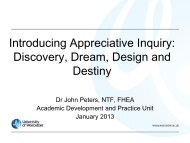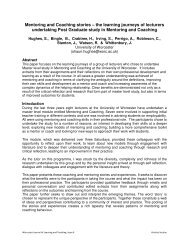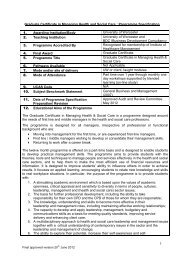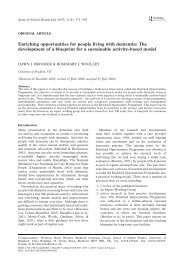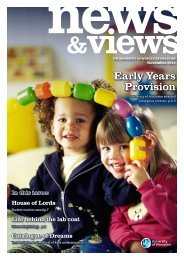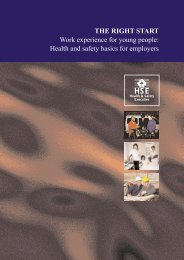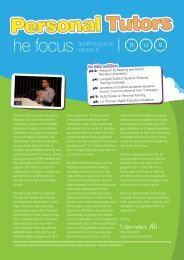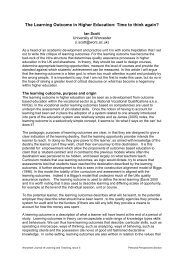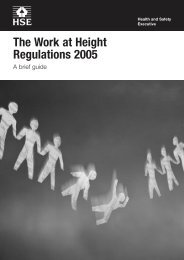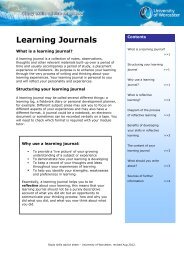BSc (Hons) Physical Education (non QTS) - University of Worcester
BSc (Hons) Physical Education (non QTS) - University of Worcester
BSc (Hons) Physical Education (non QTS) - University of Worcester
Create successful ePaper yourself
Turn your PDF publications into a flip-book with our unique Google optimized e-Paper software.
PROGRAMME SPECIFICATION – Undergraduate COURSES<br />
1. Awarding institution/body <strong>University</strong> <strong>of</strong> <strong>Worcester</strong><br />
2. Teaching institution <strong>University</strong> <strong>of</strong> <strong>Worcester</strong><br />
3. Programme accredited by N/A<br />
4. Final award <strong>BSc</strong> <strong>Hons</strong><br />
5. Programme title <strong>Physical</strong> <strong>Education</strong> (Non <strong>QTS</strong>)<br />
6. Pathways available Major, Joint & Minor<br />
7. Mode and/or site <strong>of</strong> delivery <strong>University</strong> <strong>of</strong> <strong>Worcester</strong><br />
8. Mode <strong>of</strong> attendance Full Time / Part Time<br />
9. UCAS Code Joint Only<br />
10. Subject Benchmark statement<br />
and/or pr<strong>of</strong>essional body<br />
statement<br />
11. Date <strong>of</strong> Programme Specification<br />
preparation/revision<br />
Hospitality, Leisure, Sport & Tourism<br />
(2008)<br />
July 2008<br />
(IQC Jan 2011)<br />
Amended August 2011<br />
Amended September 2011<br />
12. <strong>Education</strong>al aims <strong>of</strong> the programme<br />
The educational aims provide the over-arching structure to the course, together with<br />
also establishing its key philosophical underpinnings.<br />
The course enables students to:<br />
Develop a depth <strong>of</strong> integrated knowledge, critical perspectives, and skills<br />
(including research skills and research that informs practice), which characterise<br />
the physical education programme;<br />
Utilise appropriate teaching and learning theories, models and practices to a<br />
range <strong>of</strong> practical contexts;<br />
Engage effectively in critical analysis, reflection and evaluation;<br />
Develop students who: can practice independently, can draw on relevant<br />
knowledge, have skills and attributes to perform effectively in the domain <strong>of</strong><br />
<strong>Physical</strong> <strong>Education</strong>, demonstrate safety and ethical awareness, can undertake a<br />
range <strong>of</strong> leadership and management roles;<br />
Facilitate the development <strong>of</strong> transferable and graduate skills to enable students<br />
to engage effectively in lifelong learning and continuing pr<strong>of</strong>essional<br />
development.<br />
It should also be noted that because these aims are the guiding statements structuring<br />
the course they can be both explicitly dealt with in modules, whilst in other instances<br />
they are more implicitly referred to.<br />
A <strong>Physical</strong> <strong>Education</strong> graduate will have developed an understanding <strong>of</strong> a complex body<br />
<strong>of</strong> knowledge, elements/aspects <strong>of</strong> which are at the current boundaries <strong>of</strong> the academic<br />
discipline <strong>of</strong> sport and exercise science. Through this, the <strong>Physical</strong> <strong>Education</strong> graduate<br />
will have developed analytical techniques and problem-solving skills that can be applied<br />
in many types <strong>of</strong> employment. The <strong>Physical</strong> <strong>Education</strong> graduate will be able to evaluate<br />
evidence, arguments and assumptions, to reach sound judgements, and to<br />
communicate effectively.
A <strong>Physical</strong> <strong>Education</strong> graduate should have the qualities needed for employment in<br />
situations requiring the exercise <strong>of</strong> personal responsibility, and decision-making in<br />
complex and unpredictable circumstances.<br />
<strong>BSc</strong> (<strong>Hons</strong>) <strong>Physical</strong> <strong>Education</strong> (Non <strong>QTS</strong>)<br />
<strong>Education</strong>al Aims’ <strong>of</strong> the Programme Developed by Module<br />
Module<br />
Code<br />
Module Title A B C D E<br />
LEVEL 4<br />
SPRT1001 Foundations <strong>of</strong> Sport (Practical<br />
<br />
Kinesiology)<br />
SPRT1002 Foundations <strong>of</strong> Sport (Psychology) <br />
SPRT1003 Foundations <strong>of</strong> Sport (Physiology) <br />
SPRT1004 Introduction to Socio-Cultural Issues in <br />
Sport<br />
SPRT1005 Introduction to Motor Learning and Skill <br />
Acquisition<br />
SPRT1009 Dance and Gymnastics 1 <br />
SPRT1015 PE: Context and Issues <br />
SPRT1016 Teaching Games in Primary School <br />
SPRT1017 Fundamentals <strong>of</strong> Athletics <br />
LEVEL 5<br />
SPRT2001 Research Methods <br />
SPRT2002 Sociology <strong>of</strong> Sport <br />
SPRT2003 The Physiology <strong>of</strong> Sport and Exercise <br />
SPRT2004 The Psychology <strong>of</strong> Sport and Exercise <br />
SPRT2010 Mind and Body: Critical Enquiry in PE <br />
SPRT2011 Vocational Placement <br />
SPRT2012 Swimming and Outdoor Adventurous<br />
<br />
Activities<br />
SPRT2025 Aesthetic Activities: Dance and Gymnastics <br />
2<br />
SPRT2026 Teaching Games in Secondary Schools <br />
LEVEL 6<br />
SPRT3001/ Independent Study <br />
2<br />
SPRT3017 Pedagogy and Performance – Participatory <br />
Action Research<br />
SPRT3018 Application <strong>of</strong> Learning Theory <br />
SPRT3019 Teaching the 14-19 Pathway <br />
SPRT3021 Global and Olympic Sport <br />
SPRT3022 Sport and Disability <br />
SPRT3026 The Developing Child in Sport
13. Intended learning outcomes and learning, teaching and assessment methods<br />
The course provides opportunities for students to develop and demonstrate<br />
knowledge, understanding, skills, qualities and other relevant attributes. The<br />
following learning outcomes have been informed by the Benchmark statements<br />
(see Section 16) and adapted according to the needs <strong>of</strong> this particular course.<br />
The learning outcomes for the <strong>Physical</strong> <strong>Education</strong> degree course are as follows:<br />
Knowledge and understanding:<br />
1. Demonstrate critical<br />
evaluation <strong>of</strong> key physical<br />
skills and key concepts when<br />
applied to the academic and<br />
pr<strong>of</strong>essional practice <strong>of</strong><br />
physical education, in<br />
particular the scientific<br />
knowledge underpinning<br />
movement efficiency.<br />
2. Demonstrate capacity for<br />
independent, creative and<br />
original thought and an<br />
autonomous approach to their<br />
own learning and continuing<br />
pr<strong>of</strong>essional development.<br />
3. Critically appraise and<br />
challenge the moral, ethical<br />
and safety issues in physical<br />
education and critically<br />
evaluate processes for their<br />
effective management in<br />
response to legislation and<br />
pr<strong>of</strong>essional codes <strong>of</strong><br />
conduct.<br />
4. Critically reflect on the<br />
learning process and<br />
individual performance in<br />
order to effectively plan,<br />
design and manage practical<br />
activities.<br />
Cognitive and intellectual skills:<br />
5. Critically evaluate and<br />
challenge the development <strong>of</strong><br />
subject matter, scientific and<br />
pedagogical content, and<br />
curricula knowledge in<br />
physical education,<br />
demonstrating a critical<br />
awareness <strong>of</strong> an inter-<br />
Examples <strong>of</strong> learning, teaching and assessment<br />
methods used:<br />
Students will develop their knowledge and<br />
understanding <strong>of</strong> the <strong>Physical</strong> <strong>Education</strong><br />
curriculum, values and beliefs, specific <strong>Physical</strong><br />
<strong>Education</strong> pedagogy and more generic learning<br />
and teaching principles e.g. how to write units <strong>of</strong><br />
work and plan lessons, understanding <strong>of</strong> risk<br />
assessment and safety considerations,<br />
strategies to ensure that they are able to meet<br />
the needs <strong>of</strong> all pupils, etc. Knowledge and<br />
understanding is assessed through a range <strong>of</strong><br />
different assessment opportunities in every<br />
module.<br />
Examples <strong>of</strong> learning, teaching and assessment<br />
methods used:<br />
Every module provides opportunities for<br />
students to develop their thinking skills and<br />
intellectual ability e.g. examining values and<br />
beliefs and the impact these have on learning<br />
and teaching in <strong>Physical</strong> <strong>Education</strong>, developing<br />
questioning skills in order to challenge all pupils<br />
and ensure that they make appropriate
disciplinary approach to their<br />
own and children‟s learning.<br />
6. Demonstrate their problemsolving<br />
skills and ability to<br />
synthesise information in a<br />
critically evaluative way using<br />
appropriate research methods<br />
and interpretive analysis<br />
based in pr<strong>of</strong>essional<br />
practice.<br />
7. Demonstrate emotional<br />
intelligence and sensitivity in<br />
the context <strong>of</strong> inclusion and<br />
diversity<br />
Practical skills relevant to<br />
employment:<br />
8. Demonstrate safety and<br />
ethical awareness in the<br />
performance, teaching and<br />
planning <strong>of</strong> practical activities<br />
in physical education<br />
9. Display a critical insight into<br />
the changing nature <strong>of</strong><br />
physical education and sport<br />
policy/organisation and<br />
practice.<br />
10. Select modules that meet<br />
individual, educational needs,<br />
vocational aspirations and<br />
career development within the<br />
framework <strong>of</strong> modules<br />
available for the course.<br />
Transferable/key skills:<br />
11. Communicate information<br />
effectively utilising oral,<br />
written and visual forms<br />
12. Demonstrate competency in<br />
numeracy and ICT skills<br />
appropriate to the situation.<br />
13. Demonstrate effective inter<br />
and intra-personal skills for<br />
learning.<br />
14. Develop self-reflection<br />
through the completion <strong>of</strong> the<br />
PDP and core modules<br />
progress, the ability to form a logical argument<br />
and debate issues and ideas from a sound<br />
knowledge base. Some <strong>of</strong> the examples listed<br />
above are also assessed formally e.g. oral<br />
defence.<br />
Examples <strong>of</strong> learning, teaching and assessment<br />
methods used:<br />
At every level students have different<br />
opportunities to develop their teaching skills in a<br />
practical setting, ranging from small group<br />
teaching sessions over a few weeks involving<br />
pupils from local schools, to more intensive work<br />
placement modules. A number <strong>of</strong> these<br />
experiences are also assessed e.g. planned<br />
units <strong>of</strong> work, production <strong>of</strong> resources, reflective<br />
and evaluative writing etc.<br />
In all practical modules, students are also<br />
engaged in tasks and where appropriate<br />
assessments which help them to develop their<br />
performance skills, enabling them to be more<br />
competent and confident teachers across a<br />
range <strong>of</strong> subject specific activities, such as<br />
dance, gymnastics, athletics etc.<br />
Examples <strong>of</strong> learning, teaching and assessment<br />
methods used:<br />
All <strong>of</strong> the modules contain numerous<br />
transferable skills and many <strong>of</strong> these are also<br />
included in a range <strong>of</strong> different assessments<br />
opportunities, these include:<br />
Communication and presentation skills –<br />
through the sharing <strong>of</strong> ideas, providing peer<br />
feedback, formal presentation <strong>of</strong> ideas and<br />
research, etc.<br />
Interactive and group skills – numerous<br />
opportunities to work as a group, taking on<br />
different roles and responsibilities in order to<br />
support own and other s development.<br />
Problem solving skills- every lecture will engage
the students in problem solving in some respect,<br />
e.g. linking two ideas together to create a<br />
gymnastic sequence; adapting an idea to<br />
simplify or make it more challenging; how to<br />
present findings in the most appropriate way to<br />
demonstrate understanding, etc.<br />
Ability to self-appraise and reflect on own<br />
strengths and weaknesses – informally via<br />
opportunities to feedback on particular aspects<br />
<strong>of</strong> performance; formally via written reflective<br />
assessment tasks, etc.<br />
Ability to plan and manage learning – meeting<br />
deadlines for directed study tasks and<br />
assessments, using tutorial support, etc.<br />
ICT skills- use <strong>of</strong> camera technology to identify<br />
how to improve work, creation <strong>of</strong> resources such<br />
as DVD‟s to support learning and demonstrate<br />
knowledge and understanding, etc.<br />
Research skills – using journals to support<br />
thinking and develop understanding, observing<br />
practice <strong>of</strong> others, using questionnaires or<br />
interviews to find out information about a<br />
particular aspect <strong>of</strong> practice, etc.<br />
Learning Outcomes Developed and Assessed by each Module<br />
Module 1 2 3 4 5 6 7 8 9 10 11 12 13 14<br />
SPRT1001 <br />
SPRT1002 <br />
SPRT1003 <br />
SPRT1004 <br />
SPRT 1005 <br />
SPRT1009 <br />
SPRT 1015 <br />
SPRT1016 <br />
SPRT1017 <br />
SPRT2001 <br />
<br />
SPRT2002 <br />
SPRT2003 <br />
SPRT2004 <br />
SPRT2010 <br />
<br />
SPRT2011 <br />
<br />
SPRT2012
SPRT2025 <br />
<br />
<br />
SPRT2026 <br />
<br />
SPRT3001/2 <br />
<br />
<br />
<br />
<br />
SPRT3017 <br />
<br />
<br />
SPRT3018 <br />
<br />
SPRT3019 <br />
<br />
SPRT3021 <br />
<br />
<br />
<br />
SPRT3022 <br />
<br />
<br />
SPRT3026 <br />
14. Assessment Strategy<br />
Regulation <strong>of</strong> assessment<br />
The course operates under the Undergraduate Regulatory Framework (URF) which sets<br />
out the full regulations for passing modules, grading <strong>of</strong> modules, retrieving failed<br />
modules, progression from one academic level to the next, requirements for awards,<br />
and how the degree is classified.<br />
The course is fully compliant with UW regulations for assessment, mitigation, appeals<br />
and complaints. For further details on any <strong>of</strong> these areas please follow this link to the<br />
Registry website or see the UW Student Handbook.<br />
How your work is assessed<br />
Each assessment item has published specific marking criteria contained in the module<br />
outline given to students at the beginning <strong>of</strong> the module. These are based on the<br />
generic assessment criteria contained within the UW Student Handbook.<br />
The table below shows the full range <strong>of</strong> assessment items used within the subject, by<br />
module and also shows the relative weightings <strong>of</strong> each item.<br />
Assessment Methods used per Module<br />
Module Written Presentation Practical Exam<br />
SPRT1009 40% 60%<br />
SPRT1015 70% 30%<br />
SPRT1016 70%<br />
30%<br />
SPRT1017 40%
60%<br />
SPRT2010 50% 50%<br />
SPRT2011 70%<br />
30%<br />
SPRT2012 50%<br />
50%<br />
SPRT2025 50% 50%<br />
SPRT2026 50% 50%<br />
SPRT3017 75%<br />
25%<br />
SPRT3018 100%<br />
SPRT3019 60% 40%<br />
NB Module Leaders review the pattern and range <strong>of</strong> assessment on an annual basis.<br />
Any proposed amendments are presented at the Institute Quality Committee. If they are<br />
approved the matrix above will updated to reflect the amendments.<br />
Word limits<br />
All coursework items are set a maximum word length, and you should indicate the<br />
number <strong>of</strong> words you have used at the bottom <strong>of</strong> each piece <strong>of</strong> coursework (word<br />
processors will count words for you).<br />
Submission <strong>of</strong> coursework<br />
Submission dates are indicated in each module outline published at the start <strong>of</strong> each<br />
semester. Module tutors will set deadlines for the submission <strong>of</strong> work. Module tutors are<br />
not permitted to grant extensions for the late submission <strong>of</strong> assessment items.<br />
They must be adhered to since degree level work involves learning how to organise<br />
your own work satisfactorily. You should include an item report form and an assessment<br />
tracking sheet when submitting assessment items in order to receive feedback and an<br />
electronic receipt.<br />
All course work due in during normal teaching weeks must be placed in the collection<br />
box located at the Sport & Exercise Science Reception located in the corridor near the<br />
Yelland and Urwin Lecture Theatres by 3pm on the due date. Some modules will require<br />
you to submit your work via SOLE, where this is the case, you will be informed in the<br />
module outline.<br />
Late Submissions<br />
Students who submit coursework late but within five days <strong>of</strong> the published due date will<br />
have the work marked and the actual grade obtained will be communicated to the<br />
student for feedback on his/her performance but the grade awarded will be capped at<br />
the minimum pass grade, unless a claim <strong>of</strong> mitigating circumstances is made and<br />
upheld. The grade “L1” will be used to indicate that the grade has been capped due to<br />
late submission.
Students who submit coursework later than five days but within two weeks <strong>of</strong> the<br />
published due date will not have the work marked. A grade <strong>of</strong> “L2” will be used to<br />
indicate that work had been submitted. Students who have a claim <strong>of</strong> mitigating<br />
circumstances upheld and have submitted the assessment item within two weeks <strong>of</strong> the<br />
due date, the original assessment item will be marked. In all other cases the student will<br />
be required to complete a new assessment item.<br />
Students who submit coursework after the due date that is marked on a Pass/Fail basis<br />
or submitted for reassessment and subject to being capped at the minimum pass mark<br />
will not have the work marked. A grade <strong>of</strong> “L2” will be used to indicate that work had<br />
been submitted. Students who have a claim <strong>of</strong> mitigating circumstances upheld and<br />
have submitted the assessment item within two weeks <strong>of</strong> the deadline, the original<br />
assessment item will be marked. In all other cases the student will be required to<br />
complete a new assessment item.<br />
Non-submissions<br />
When an assessment item is not submitted within two weeks <strong>of</strong> the due date, it will be<br />
counted as an attempt and marked as 0 with a grade <strong>of</strong> NS. This will result in the<br />
overall module being failed, regardless <strong>of</strong> any apparent overall pass grade. The student<br />
will not be permitted a reassessment opportunity and will be required to retake the<br />
module.<br />
Where a student is unable to submit an assessment item by the due date because <strong>of</strong><br />
illness or other valid reasons (“Mitigating Circumstances”) a student may submit an<br />
application to the Mitigations Committee.<br />
You must keep an electronic copy <strong>of</strong> your work in the unlikely event <strong>of</strong> your original work<br />
being mislaid.<br />
Coursework with a hand in date outside normal teaching weeks, for example in January,<br />
may be posted in the collection box in the collection point indicated above or<br />
alternatively may be submitted by post as long as the following guidelines are met:<br />
the assessment item must be sent by recorded or special delivery<br />
it must be posted (franked) by Royal Mail no later than the assessment due date<br />
it should be addressed to:<br />
Assignment Administrator<br />
Institute <strong>of</strong> Sport & Exercise Science<br />
<strong>University</strong> <strong>of</strong> <strong>Worcester</strong><br />
Henwick Grove<br />
<strong>Worcester</strong><br />
WR2 6AJ<br />
Return and Collection <strong>of</strong> Marked Work<br />
Where work has not been returned via SOLE, students will be given the opportunity to<br />
collect their work at the beginning <strong>of</strong> each semester. This process is managed by the<br />
Institute‟s Administration Office. Students should be aware that marked work is only<br />
retained for a period <strong>of</strong> twelve months before it is destroyed. Students should also note<br />
that a sample <strong>of</strong> work is always sent to the external examiner for scrutiny. This is always<br />
returned to the <strong>University</strong>, but students may have to wait a little longer for their work to
e returned if it is included in the sample. In the case <strong>of</strong> failed work students will be able<br />
to access this directly from the Institute‟s Administration Office once they have been<br />
informed by Registry that they are required to resubmit work for reassessment<br />
A transcript <strong>of</strong> results will be available on-line via your SOLE page once marks have<br />
been agreed. To view your results click on the „My Results‟ Tab when using your SOLE<br />
page.<br />
How your work is marked<br />
The Marking and Moderation Policy:<br />
All assessed, written student work is subject to a rigorous process <strong>of</strong> within module<br />
moderation:<br />
All work is subject to a process <strong>of</strong> moderation to ensure that marking for the<br />
module is consistent. This process takes place as soon as possible following the<br />
submission deadline and is the responsibility <strong>of</strong> the module leader. The module<br />
leader will identify a blind sample <strong>of</strong> work (15%) and ensure that the sample is<br />
cross-marked by all members <strong>of</strong> the module team (usually no later than 72 hours<br />
after the work has been received). All members <strong>of</strong> the team will then meet to<br />
confirm that all work in the sample has been marked according to the prescribed<br />
grading criteria;<br />
If the original sample <strong>of</strong> work selected for moderation is particularly narrow in<br />
range the module leader will select a number <strong>of</strong> additional assignments for<br />
marking at the moderation meeting;<br />
The Institute‟s „Assessment Moderation Form‟ is completed by the module leader.<br />
This form will record the discussions/issues raised at the meeting. A copy <strong>of</strong> this<br />
form is included in the sample <strong>of</strong> work sent to external examiners. This is also<br />
evidenced by detailed commentary on the item report form or grading template<br />
and will reflect agreement <strong>of</strong> the final grade between all module tutors. In<br />
instances where two markers cannot agree a grade, the work is passed to a third<br />
marker. The decision <strong>of</strong> the third marker is final;<br />
Once the process <strong>of</strong> moderation has been completed the rest <strong>of</strong> the work can be<br />
marked by individual tutors. Tutors are then required to return all marked work to<br />
the module leader at least 48 hours before marks the ETM deadline<br />
A sample <strong>of</strong> work (15%) from modules within the Course is sent to UW approved<br />
External Examiners for further scrutiny and comment. The sample will include a<br />
full range <strong>of</strong> the grades awarded for the module as well as some <strong>of</strong> those<br />
included in the sample for moderation<br />
NB. All grades awarded are provisional until confirmed at the Exam Board<br />
The module leader will normally be the person to establish the best pattern to ensure<br />
the policy is followed. If this is not the case then the Course Leader will assume<br />
responsibility.<br />
In any instances where modules are taught by a single tutor, the Course Leader will<br />
ensure a second tutor from within the Course team is appointed to act as second marker<br />
for purposes <strong>of</strong> moderation. This will be decided at the Course team meeting at the<br />
beginning <strong>of</strong> the semester.<br />
The essential feature is that the module leader must ensure and demonstrate through
the completion <strong>of</strong> the Assessment Moderation Form that a sample <strong>of</strong> all work has been:<br />
Moderated by all members <strong>of</strong> the module team. In instances where modules are taught<br />
by a single tutor, the sample selected for moderation must be double marked by another<br />
tutor.<br />
A module is selected by the Course team after the Exam Board for further scrutiny. This<br />
decision should be based on analysis <strong>of</strong> statistics.<br />
Sampling and Guidance Notes<br />
Sampling at 15% is the norm depending on type <strong>of</strong> module, the larger the group<br />
the smaller the percentage);<br />
Moderation details must be recorded by the module leader on the assessment<br />
moderation form;<br />
Double marking must be recorded with appropriate comments and signature on<br />
the Item Report Form or grading template;<br />
All fails are double marked.<br />
NB The one exception to this process is the independent study, where all submissions<br />
are double marked<br />
Feedback on your work<br />
Feedback in the academic realm can take many forms, but each can be used to improve<br />
your performance. Some <strong>of</strong> the different types <strong>of</strong> feedback include:<br />
Written comments from your tutor, usually attached to your assignments;<br />
Verbal comments from your tutor associated with your work;<br />
Generic feedback from tutors covering particular strengths/weaknesses found in<br />
the work <strong>of</strong> a particular student group;<br />
Comments from other students about your work (peer feedback);<br />
Your own comments and reflections on your work (self-assessment & feedback).<br />
Please see the Study Skills page on the Student Services website for information on<br />
how to use feedback to improve your work.<br />
Study Skills<br />
Study Skills Advice Sheets have been developed in order to help you to plan and carry<br />
out your coursework and assessments, making the most <strong>of</strong> the time available and<br />
helping you to achieve your potential.<br />
The induction programme at the start <strong>of</strong> the course includes PDP and study skills which<br />
are also embedded throughout the course.<br />
Mitigating Circumstances<br />
These are defined as exceptional circumstances, outside <strong>of</strong> your control, that have<br />
affected your academic performance. If a student believes that their performance,<br />
absence or <strong>non</strong>-submission <strong>of</strong> work in an item <strong>of</strong> assessed work was due to illness or<br />
other valid reasons, the student may submit a claim under procedures approved by<br />
Academic Board. See Procedure for Dealing with claims <strong>of</strong> Exceptional Mitigating<br />
Circumstances.<br />
Claims <strong>of</strong> exceptional mitigating circumstances should be submitted on the mitigating
circumstances form before results are considered by the Board <strong>of</strong> Examiners and before<br />
the published deadline.<br />
Information on how to submit a claim <strong>of</strong> Mitigating circumstances can be found via your<br />
SOLE page in the “My Course Details” tab. Full procedures and regulations regarding<br />
mitigation can be found on the Registry Services website.<br />
Cheating<br />
Cheating is defined by the <strong>University</strong> as any attempt to gain an unfair advantage in an<br />
assessment or assisting another student to gain an unfair advantage in an assessment.<br />
See Procedures for investigation <strong>of</strong> cases <strong>of</strong> alleged cheating.<br />
Cheating is a serious <strong>of</strong>fence and takes many forms including:<br />
Plagiarism – passing <strong>of</strong>f the work <strong>of</strong> someone else as it if is your own.<br />
Collusion – working closely with someone else to produce an assignment that is meant<br />
to be the work <strong>of</strong> an individual.<br />
The Internet is frequently used to download material to use in assignments. The<br />
<strong>University</strong> deals severely with students who cheat and penalties extend to suspension<br />
and withdrawal for a second (or particularly serious first) <strong>of</strong>fence.<br />
In order to avoid an allegation <strong>of</strong> cheating make sure that you follow guidance on<br />
conventions for referencing and for use <strong>of</strong> quotations. If you are in any doubt, check<br />
with your tutors who will be happy to advise you.<br />
Guidance on Presentation <strong>of</strong> Assessed Work<br />
It is <strong>of</strong> particular importance that your handwriting is legible. If your work is difficult to<br />
read you cannot expect to get as good a mark as the same work if presented neatly. In<br />
extreme cases illegible work will not be read at all and will receive a mark <strong>of</strong> zero. You<br />
will need to be able to write speedily and legibly in tests or exams. By the end <strong>of</strong> the first<br />
year <strong>of</strong> your course you will be expected to submit your work word-processed; you are<br />
strongly advised to become familiar with this technology at the earliest opportunity.<br />
Word processed documents should:<br />
Include complete title <strong>of</strong> the assessment item and module code;<br />
Use the Arial font 12 point size;<br />
Use one and a half or double spacing;<br />
Use margins <strong>of</strong> at least 2.5cm;<br />
Include Page Numbers.<br />
If the work is marked a<strong>non</strong>ymously you should not include your name on any page.<br />
Use <strong>of</strong> English Language<br />
As will be seen in the assessment criteria, quality <strong>of</strong> language use, including spelling,<br />
grammar, syntax and overall structure, is taken into account in awarding a grade. It is<br />
essential that language is used correctly if ideas and arguments are to be<br />
communicated effectively. The Level Four module UMSC1420 Academic English and<br />
Study Skills is designed to assist International Students.<br />
You should ensure that you always spell-check and pro<strong>of</strong>-read your work (the
spellcheckers in word processors do not pick up all errors). It is a good idea to leave a<br />
piece <strong>of</strong> work for a day or so if possible, and then revisit it as if you were going to mark it<br />
yourself - you may be surprised at how many errors and unclear sentences you find<br />
when you do this. Careful pro<strong>of</strong>-reading usually pays dividends.<br />
Bibliographies and referencing<br />
The use <strong>of</strong> references in the text fulfils a number <strong>of</strong> purposes:<br />
it enables you to provide supportive evidence to illustrate a point you are making<br />
it provides evidence to the reader that you have reviewed the literature in a<br />
specific Course <strong>of</strong> study and you are able to introduce theories and/or<br />
perspectives that are presented within the literature which support and link to<br />
your own ideas<br />
it enables the reader to identify the source <strong>of</strong> the literature you have reviewed, so<br />
they can make use <strong>of</strong> the literature themselves (adapted from Continuing<br />
Pr<strong>of</strong>essional Development, Faculty <strong>of</strong> <strong>Education</strong> and Psychology, 1999).<br />
You will be expected to cite references to your sources <strong>of</strong> information within your<br />
text by quoting the author's name and the date <strong>of</strong> publication immediately<br />
following the information. There are a number <strong>of</strong> accepted ways <strong>of</strong> presenting the<br />
references. You must use the Harvard Referencing System (detailed instruction<br />
in this method can be found via the following link): Harvard<br />
Study Skills Advice Sheets have been developed in order to help you to plan and carry<br />
out your coursework and assessments, making the most <strong>of</strong> the time available and<br />
helping you to achieve your potential.<br />
Appeals and Complaints<br />
Sometimes things do go wrong. In most cases matters can be resolved quickly and<br />
informally at a local level. However, if you continue to be dissatisfied with the response<br />
then you should make an academic appeal or a complaint.<br />
If you are appealing against an academic decision, you should follow the Appeals<br />
procedure. You will find details here <strong>of</strong> how to challenge a decision.<br />
The Complaints procedure is designed to complement the appeals process and will<br />
consider any other subject relating to the student experience.<br />
15. Programme structures and requirements<br />
Award map<br />
Award maps are designed to show you which modules must be taken in order to gain<br />
different awards. For example, if you are planning to achieve a Single Honours degree<br />
in a subject, it is likely that you will have to take certain modules as prerequisites for<br />
further study in any given area. Your academic (personal) tutor or members <strong>of</strong> the<br />
course team will advise you on these choices.<br />
Module<br />
Code<br />
SPRT1001<br />
SPRT1002<br />
Module Title Credit Joint<br />
<strong>Hons</strong><br />
Prerequisites<br />
Foundations <strong>of</strong> Sport<br />
15 O None<br />
(Practical Kinesiology)<br />
Foundations <strong>of</strong> Sport<br />
15 O None<br />
(Psychology)
SPRT1003<br />
Foundations <strong>of</strong> Sport<br />
(Physiology)<br />
15 M None<br />
SPRT1016<br />
Teaching Games in Primary<br />
Schools<br />
15 O None<br />
SPRT1017 Fundamentals <strong>of</strong> Athletics 15 O None<br />
Joint Pathway Requirements at Level 4<br />
All Joint Students must take, SPRT1003 and, SPRT1009. In addition, all students who are<br />
intending to progress onto a PGCE PE course are strongly advised to take at least two from<br />
SPRT1015, SPRT1016 and, SPRT1017 as free choice modules. All Honours Students are<br />
permitted to choose two free choice modules at Level 4 from other Open modules within the<br />
Undergraduate Regulatory Framework including those listed above as optional (subject to<br />
availability).<br />
LEVEL 5<br />
SPRT1004 Introduction to Socio- 15 O None<br />
Cultural issues<br />
SPRT1005 Introduction to Motor Learning 15 O None<br />
& Skill Acquisition<br />
SPRT1009 Dance & Gymnastics 1 15 M None<br />
SPRT1015 PE: Context & Issues 15 O None<br />
Module Module Title Credit Major Joint Minor Prerequisites<br />
Code<br />
<strong>Hons</strong> <strong>Hons</strong> <strong>Hons</strong><br />
SPRT2001 Research Methods 15 M M/O* NA None<br />
SPRT2002 Sociology <strong>of</strong> Sport 15 O O O None<br />
SPRT2003 The Physiology <strong>of</strong> Sport and 15 O O O None<br />
Exercise<br />
SPRT2004 The Psychology <strong>of</strong> Sport and 15 O O O SPRT1002<br />
Exercise<br />
SPRT2010 Mind & Body: Critical Enquiry 15 M M O None<br />
in PE<br />
SPRT2011 Vocational Placement 15 M M O None<br />
SPRT2012<br />
SPRT2025<br />
SPRT2026*<br />
Swimming & Outdoor<br />
Adventurous Activities<br />
Aesthetic Activities: Dance &<br />
Gym 2<br />
Teaching Games in<br />
Secondary Schools<br />
15 O O O None<br />
15 O O O SPRT1009 or<br />
other relevant<br />
experience<br />
15 O O O None
SPRT2026* Students on joint/major/minor pathways with Sports Studies or Sports<br />
Coaching Science may not choose SPRT2026 AND SPRT2018 (Invasion games)<br />
Major Pathway Requirements at Level 5<br />
All Major Students must take SPRT2001, SPRT2010 and, SPRT2011 plus at least one<br />
optional module listed from those above. Students must also choose 2 modules from<br />
their minor pathway. In addition, students are permitted to choose two free choice<br />
modules at Level 5 from others listed above as optional or from Open modules within<br />
the Undergraduate Regulatory Framework including those (subject to availability).<br />
Joint Pathway Requirements at Level 5<br />
All Joint Students must take SPRT2010 and, SPRT2011 plus at least one optional<br />
module from either SPRT2012, SPRT2025 AND SPRT2026. Students must also choose<br />
3 modules from their other joint pathway. In addition, students are permitted to choose<br />
two free choice modules at Level 5 from others listed above as optional, or from Open<br />
modules within the Undergraduate Regulatory Framework (subject to availability).<br />
Minor Honours Requirements at Level 5<br />
Minor students must choose 2 modules from the optional modules listed above.<br />
In addition:<br />
Students who are intending to progress onto a PGCE PE course are strongly advised to<br />
take at least two from SPR2012, SPRT2025 and SPRT2026 as free choice modules.<br />
LEVEL 6<br />
Module Code Module Title Credit Major Joint Minor Prerequisites<br />
<strong>Hons</strong> <strong>Hons</strong> <strong>Hons</strong><br />
SPOR3001/2 Independent Study 30 M M/O NA SPOR2001<br />
SPRT3017 Pedagogy and Performance 15 M M O None<br />
– Participatory Action<br />
Reseacrh<br />
SPRT3018 Application <strong>of</strong> Learning<br />
Theory<br />
15 M M O SPRT2011<br />
SPRT 2010<br />
SPRT3019 The 14 – 19 Curriculum 15 O O O None<br />
SPRT3021 Global and Olympic Sport 15 O O O None<br />
SPRT3022 Sport & Disability 15 O O O None<br />
SPRT3026<br />
The Developing Child in<br />
Sport<br />
15 O O O None<br />
Major Honours Requirements at Level 6<br />
All Major students must take the double mandatory Independent Study module<br />
(SPRT3001/02) over one or two semesters and three mandatory modules SPRT3017<br />
SPRT3018, SPRT3019, plus one other optional module from those listed above (subject<br />
to availability).
Joint Honours Requirements at Level 6<br />
If intending to complete an Independent Study in <strong>Physical</strong> <strong>Education</strong> students must<br />
choose SPRT3001/2 (double module) and SPRT3017 and SPRT3018. If the<br />
independent study is completed in another subject area students will be required to take<br />
SPRT3017, SPRT3018, plus two optional modules listed from those above (subject to<br />
availability).<br />
Minor Honours Requirements at Level 6<br />
Minor students must choose 2 modules from the optional modules listed above.<br />
16. QAA Academic Infrastructure<br />
Like all Higher <strong>Education</strong> courses in the UK, this award is designed with reference to the<br />
Academic Infrastructure, a means <strong>of</strong> describing academic standards in terms <strong>of</strong> the<br />
academic level you are expected to achieve and, in broader terms, the content that will<br />
be covered.<br />
This course makes reference to the QAA (2008) Hospitality, Leisure, Sport and Tourism<br />
Network (HLSTN) general benchmark statements.<br />
Full copies <strong>of</strong> the above documents can be found by visiting the AQU website or use the<br />
direct link to the HLSTN website:<br />
http://www.hlst.heacademy.ac.uk/events/seminars2000/benchmarks.html<br />
The Sport Benchmark statements include four subject areas which are stated as being<br />
„broadly concerned with sport‟. These areas relate to the:<br />
Human responses and adaptations to sport and exercise;<br />
Performance <strong>of</strong> sport and exercise and its enhancement, monitoring and<br />
analysis;<br />
Historical, social, political, economic and cultural diffusion, distribution and impact<br />
<strong>of</strong> sport policy,<br />
The study <strong>of</strong> planning, management and delivery <strong>of</strong> sporting opportunities.<br />
These four sport benchmark areas vary in relation to their relevancy to three key types<br />
<strong>of</strong> sport related degrees, which are sport science, sport studies and sport management.<br />
These diverse degree pathways should “normally” embrace at least one or two <strong>of</strong> the<br />
previously noted sport benchmark subject areas.<br />
In the context <strong>of</strong> the <strong>Physical</strong> <strong>Education</strong> course all the previously mentioned study areas<br />
can be found in the course. These benchmark statements are mapped out in a matrix in<br />
relation to the key modules where they are embedded (which can relate to both the<br />
module learning outcomes and the indicative content).<br />
Common to all modules is the opportunity to learn through the integration <strong>of</strong> theory with<br />
practice. Although students are expected to engage with a challenging and suitable<br />
range <strong>of</strong> theories, concepts and principles, the applied context within which a student<br />
learns is a driver for our degree.<br />
The course is fully compliant with the <strong>University</strong>‟s Curriculum Design Policy
The Framework for HE Qualifications (FHEQ)<br />
The programme is fully compliant with the FHEQ ensuring that the qualification<br />
represents appropriately the level <strong>of</strong> achievement and reflects accurately the field <strong>of</strong><br />
study.<br />
QAA Code <strong>of</strong> Practice for Placement Learning<br />
The Institute has responded to the QAA Code <strong>of</strong> Practice by the development <strong>of</strong> two<br />
separate Placement Guides; one for students and one for employers, which respond to<br />
each <strong>of</strong> the precepts in the code.<br />
Other QAA Codes <strong>of</strong> Practice<br />
This programme proposal is developed in full congruence with the UW response to QAA<br />
Codes <strong>of</strong> Assessment, Careers Guidance, Collaboration and Student Disabilities. Full<br />
copies <strong>of</strong> the above documents can be found by visiting the AQU website.<br />
17. Support for students<br />
Academic (Personal) Tutor System<br />
Each student, where possible, will be allocated an academic (personal) tutor from within<br />
the Course Team. You will be given an opportunity to meet with your tutor during your<br />
induction sessions and the intention behind the system is that you will develop a close<br />
working relationship, so that the tutor builds up a clear picture <strong>of</strong> your progress<br />
throughout your course. He/She will be able to <strong>of</strong>fer you both academic and pastoral<br />
advice and should be the person you contact if you have to deal with personal problems<br />
during your course.<br />
The Academic (Personal) Tutor will encourage your personal development planning<br />
(PDP) and <strong>of</strong>fer advice regarding your continuing pr<strong>of</strong>essional development (CPD) so<br />
that you receive structured face-to-face and online support to develop:<br />
Awareness <strong>of</strong> your own strengths and weaknesses<br />
A clear vision <strong>of</strong> what you want to achieve through HE study<br />
Greater understanding <strong>of</strong> how study in your discipline area at the <strong>University</strong> can<br />
help you towards your goals<br />
Responsibility for your choices in modules, work and social life<br />
A reflective approach to all the feedback you receive on your work<br />
A sense and a record <strong>of</strong> progression and achievement in your development <strong>of</strong><br />
subject and generic skills and attributes (qualities)<br />
An ability to use this greater awareness to articulate the benefits <strong>of</strong> your HE<br />
experience to others including employers<br />
The academic (personal) tutor will also:-<br />
Respond to your requests for support and help with problems which affect<br />
academic work either at subject level or by referral to other <strong>University</strong> facilities;<br />
Provide information for and assist in the drafting <strong>of</strong> the <strong>University</strong> reference.
The academic (personal) tutor is your regular point <strong>of</strong> contact within the <strong>University</strong>.<br />
Normally your academic (personal) tutor will remain with you throughout your time at the<br />
<strong>University</strong>.<br />
How <strong>of</strong>ten should I meet my Academic (Personal) Tutor?<br />
You ought to meet your academic (personal) tutors four times a year, although<br />
occasionally you may also need to contact your tutor at other times, particularly if you<br />
are experiencing problems.<br />
Personal Development Planning<br />
At the start <strong>of</strong> your programme, through your academic (personal) tutorial meetings you<br />
will have:<br />
An introduction to the opportunities provided by the programme for PDP<br />
Throughout your programme there will be:<br />
Opportunity to engage in PDP across a range <strong>of</strong> learning contexts, e.g. in theory<br />
and practice, regarding work-based, social or formal learning, experiential or<br />
information-based, Students Union activity or study abroad etc;<br />
Accessible support mechanisms for engagement in PDP across the range <strong>of</strong><br />
learning contexts, e.g. dedicated documentation for work placement or practice<br />
based learning, general PDP tools, student handbook advice, web material,<br />
structured exercises and tutor support;<br />
Opportunity to build a record <strong>of</strong> their learning achievements;<br />
Opportunity to discuss PDP with a tutor or advisor.<br />
Study Skills<br />
Effective study skills are a vital element in achieving academic success on your course.<br />
During your time at the <strong>University</strong> you will be judged on your performance in coursework<br />
and exams, and you will need to develop successful study, revision and exam<br />
techniques in order to do well.<br />
The Study Skills Advice Sheets below available from the link below have been<br />
developed in order to help you to plan and carry out your coursework and assessments,<br />
making the most <strong>of</strong> the time available and helping you to achieve your potential.<br />
http://www2.worc.ac.uk/studyskills/<br />
The Disability and Dyslexia Service within Student Services provides specialist support<br />
on a one to one basis. The <strong>University</strong> has an Equal Opportunities Policy, together with<br />
equality schemes and action plans promoting equality in relation to race, disability,<br />
gender, age and sexual orientation. Progress in implementation is monitored by the<br />
Equality and Diversity Committee.<br />
18. Admissions policy, criteria and procedures<br />
Admissions Policy for the course<br />
Our policy is to <strong>of</strong>fer a place to any student that we deem to be capable <strong>of</strong> success and<br />
who is likely to substantially benefit from the programme. We support the <strong>University</strong>‟s
mission statement <strong>of</strong> increasing access, widening participation and assisting students to<br />
achieve their potential<br />
Entry requirements<br />
The <strong>University</strong>‟s standard entry requirements apply: 4 GCSEs at Grade C or above, <strong>of</strong><br />
which two must be Maths and English, plus a minimum <strong>of</strong> 2 and maximum <strong>of</strong> 3½ A<br />
Levels or equivalent Level 3 qualifications. The current UCAS Tariff requirements for<br />
entry to the course are published in the prospectus<br />
Details <strong>of</strong> acceptable level 3 qualifications, policy in relation to mature students or<br />
applicants with few or no formal qualifications can be found in the prospectus or on the<br />
<strong>University</strong> web pages. Information on eligibility for accreditation <strong>of</strong> prior learning for the<br />
purposes <strong>of</strong> entry or advanced standing is also available from the <strong>University</strong> web pages<br />
or from the Registry Admissions Office (01905 855111).<br />
Details <strong>of</strong> acceptable level 3 qualifications, policy in relation to mature students or<br />
applicants with few or no formal qualifications can be found in the prospectus or on the<br />
<strong>University</strong> webpages. Information on eligibility for accreditation <strong>of</strong> prior learning for the<br />
purposes <strong>of</strong> entry or advanced standing is also available from the <strong>University</strong> webpages<br />
or from the Registry Admissions Office (01905 855111).<br />
Admissions procedures<br />
Full-time applicants apply through UCAS (course code C602)<br />
Part-time applicants apply directly to <strong>University</strong> <strong>of</strong> <strong>Worcester</strong> (UW)<br />
Admissions/selection criteria<br />
Prospective students should apply through UCAS and all applications will be considered<br />
by the Course Leader. All successful applicants will be required to attend an interview at<br />
the <strong>University</strong>. The decision to <strong>of</strong>fer a place will be based on a candidate‟s ability to<br />
demonstrate enthusiasm for the subject, commitment to study and the academic<br />
capability to succeed on the Course.<br />
Mature Students<br />
UW values diversity in its student body and applications from mature students are very<br />
welcome. If you fulfil the standard entry requirements as detailed above, please apply<br />
through UCAS. Students with few or no formal qualifications should contact the Registry<br />
Admissions Office (01905 855111) with details <strong>of</strong> their age, any work undertaken,<br />
including caring or organised voluntary work, and any other relevant experience gained<br />
since leaving school.<br />
Accreditation <strong>of</strong> Prior Learning.<br />
Students with relevant previous study at HND or degree level or extensive experience<br />
may be considered eligible for accreditation <strong>of</strong> prior learning. Entry may be possible to<br />
level 4 or level 5 <strong>of</strong> the course dependent upon qualifications or experience gained.<br />
Credit can also be given for individual modules.<br />
Please contact the Registry Admissions Office for further information or guidance on<br />
01905 855111.<br />
19. Methods for evaluating and improving the quality and standards <strong>of</strong> teaching and<br />
learning
All grades will be processed through the Institute UMS Board <strong>of</strong> Examiners. All active<br />
teaching staff will be required to attend, present grades and resubmission details. Each<br />
module is fully compliant with the UW Assessment Policy (see Section 20 <strong>of</strong> the<br />
Programme Specification). Semesterly Course Management Committees will be<br />
constituted by all active teaching team and 2 Course Representatives (StARs) from<br />
each year.<br />
The Course Leader will submit for agreement, to the UW Institute <strong>of</strong> Sport & Exercise<br />
Science Principal Lecturer (PL) for Quality, Learning & Teaching, the student handbook<br />
and an annual evaluation report (formerly annual monitoring report), structured in<br />
accordance with the quality assurance hand book, to be considered by Head <strong>of</strong> Institute<br />
and IQC for onward transmission, in accordance with UW guidelines.<br />
The Course Leader will submit for agreement, to the UW Institute <strong>of</strong> Sport & Exercise<br />
Science PL for Planning & Resources details <strong>of</strong> any staffing, physical resources and,<br />
timetabling requirements.<br />
The UW External Examiner and post Exam Board module investigation system (through<br />
Course Management Committees) will apply to this course.<br />
The team will seek feedback from students each time a module is run. The feedback,<br />
and module team response will be included in the quality management file for that<br />
module, thus enabling scrutiny by the UW Institute <strong>of</strong> Sport & Exercise Science PL for<br />
Quality, Learning & Teaching and any subsequent amendments/major actions should be<br />
reported to IQC and included in the annual evaluation report<br />
20. Regulation <strong>of</strong> assessment<br />
Requirements to pass modules<br />
Modules are assessed using a variety <strong>of</strong> assessment activities which are detailed in the<br />
module specifications.<br />
The minimum pass mark is D- for each module.<br />
Students are required to submit all items <strong>of</strong> assessment in order to pass a module, and<br />
in some modules, a pass mark in each item <strong>of</strong> assessment may be required.<br />
Some modules have attendance requirements<br />
Full details <strong>of</strong> the assessment requirements for a module, including the assessment<br />
criteria, are published in the module outline.<br />
Submission <strong>of</strong> assessment items<br />
Students who submit course work late but within 5 days <strong>of</strong> the due date will have work<br />
marked, but the grade will be capped at D- unless an application for mitigating<br />
circumstances is accepted.<br />
Students who submit work later than 5 days but within 14 days <strong>of</strong> the due date will not<br />
have work marked unless they have submitted a valid claim <strong>of</strong> mitigating circumstances.<br />
Students who fail to submit an item <strong>of</strong> assessment lose their right to reassessment in<br />
that module, and will be required to retake the module.<br />
For full details <strong>of</strong> submission regulations see URF.
Retrieval <strong>of</strong> failure<br />
Students are entitled to resit failed assessment items for any module that is awarded a<br />
fail grade, unless the failure was due to <strong>non</strong>-attendance or <strong>non</strong>-submission.<br />
Reassessment items that are passed are graded at D-.<br />
If a student is unsuccessful in the reassessment, they have the right to retake the<br />
module (or, in some circumstances, take an alternative module).<br />
Requirements for Progression<br />
Students at Level 4 may be permitted to progress to Level 5 when they have passed at<br />
least 90 credits at Level 4.<br />
Students at Level 5 may be permitted to progress to Level 6 when they have passed at<br />
least 90 credits at Level 5.<br />
A student who fails 90 credits or more due to <strong>non</strong>-submission will be required to<br />
withdraw from the <strong>University</strong>.<br />
Students who pass less that 90 credits but have submitted all items <strong>of</strong> assessment will<br />
be required to retake modules.<br />
Requirements for Awards<br />
Award<br />
Requirement<br />
CertHE<br />
Passed 120 credits at Level 4 or higher<br />
DipHE Passed a minimum <strong>of</strong> 240 credits with at least 105<br />
credits at Level 5 or higher<br />
Degree (<strong>non</strong>honours)<br />
Passed a minimum <strong>of</strong> 300 credits with at least 105<br />
credits at Level 5 or higher and a minimum <strong>of</strong> 60<br />
Degree with<br />
honours<br />
credits at Level 6<br />
Passed a minimum <strong>of</strong> 360 credits with at least 105<br />
credits at Level 5 or higher and a minimum <strong>of</strong> 120<br />
credits at Level 6<br />
Classification<br />
The honours classification will be determined by whichever <strong>of</strong> the following two methods<br />
results in the higher classification:<br />
Classification determined on the pr<strong>of</strong>ile <strong>of</strong> the best grades from 45 credits attained at Level 5<br />
and the best grades from 120 credits at Level 6. Level 5 and Level 6 grades count equally in the<br />
pr<strong>of</strong>ile.<br />
Classification determined on the pr<strong>of</strong>ile <strong>of</strong> the best grades from 120 credits attained at Level 6<br />
only.<br />
Institute-level Assessment Boards review and confirm results for modules, and the<br />
Board <strong>of</strong> Examiners considers students‟ mark pr<strong>of</strong>iles to make decisions about<br />
progression, awards and degree classifications as appropriate.<br />
21. Indicators <strong>of</strong> quality and standards<br />
Each course receives an annual external examiner‟s report and these reports serve as<br />
confirmation that academic standards are being upheld and appropriate actions are put<br />
in place to enhance student learning and raise student levels <strong>of</strong> achievement.
Final year students report high levels <strong>of</strong> satisfaction with their courses through the<br />
National Student Survey (NSS). Students scored their own personal development at<br />
<strong>Worcester</strong> very highly (4.2 out <strong>of</strong> 5). A score <strong>of</strong> 4.1 was recorded for overall satisfaction.<br />
(2009)<br />
At the recent OFSTED inspection (2010) <strong>of</strong> the PGCE programmes at UW, <strong>of</strong> which the<br />
PGCE Secondary <strong>Physical</strong> <strong>Education</strong> course is one, a rating <strong>of</strong> 1 was achieved, the<br />
highest possible award for an institute<br />
The <strong>University</strong> underwent a QAA Institutional Audit in March 2011. The audit confirmed<br />
that confidence can be placed in the soundness <strong>of</strong> the institution‟s current and likely<br />
future management <strong>of</strong> the academic standards <strong>of</strong> its awards and the quality <strong>of</strong> the<br />
learning opportunities available to students. The audit team highlighted several aspects<br />
<strong>of</strong> good practice, including the student academic representative (StARs) initiative, the<br />
proactive approach which supports the student experience for disabled students, the<br />
comprehensiveness <strong>of</strong> the student online environment (SOLE), the wide range <strong>of</strong><br />
opportunities afforded to students to enhance their employability, the institution‟s<br />
commitment to enhancement, and the inclusive approach to working with its<br />
collaborative partners.<br />
22. Employability and graduate destinations<br />
Career Opportunities & Links with Employers<br />
Within the Institute <strong>of</strong> Sport and Exercise Science there is a designated academic<br />
member <strong>of</strong> staff who is a Careers Coordinator. That member <strong>of</strong> staff liaises very closely<br />
with the Careers Unit within Student Services. There is a Careers notice board where<br />
opportunities are regularly posted and more recently a blackboard based careers board.<br />
Opportunities for further study<br />
Students are able to spend the second semester <strong>of</strong> their second year studying at one <strong>of</strong><br />
the Universities International Partner Institutions. Furthermore, national governing body<br />
award courses are advertised on the sports hall notice boards at a subsidised cost.<br />
Where specific sports have not been covered the student can enquire about either<br />
running the course or finding a local course to attend.<br />
Please note: This specification provides a concise summary <strong>of</strong> the main features <strong>of</strong> the<br />
programme and the learning outcomes that a typical student might reasonably be<br />
expected to achieve and demonstrate if s/he takes full advantage <strong>of</strong> the learning<br />
opportunities that are provided. More detailed information on the learning outcomes,<br />
content and teaching, learning and assessment methods <strong>of</strong> each module can be found<br />
in the module outlines and Section 3 <strong>of</strong> the course handbook. The accuracy <strong>of</strong> the<br />
information contained in this document is reviewed by the <strong>University</strong> and may be<br />
checked by the Quality Assurance Agency for Higher <strong>Education</strong>.



